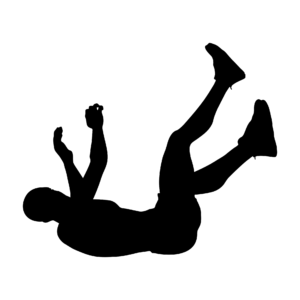WASHINGTON, DC – September 18-22, 2023 – Did you know that National Fall Prevention Awareness Week was from September 18 to 22? People can reduce their risk of falling through better understanding their risk factors and by fall-proofing the home. The more risk factors a person has, the greater the chance of falling down. Some home hazards include broken or uneven steps, loose throw rugs or unnecessary items on the floor. National organizations like the CDC and state organizations like the North Carolina Falls Prevention Coalition want to reduce the number of injuries and deaths from falls, particularly by seniors.
More than one out of four senior citizens fall each year, a total of 37 million people. Fewer than half tell their doctor about their fall. Did you know that people who fall are twice as likely to fall again? 20% of falls cause a serious injury like broken bones or a head injury. You may have close relatives like I do that have died after falling down. My uncle fell, didn’t see a doctor right away even though he struck his head against a wall, and became confused 1 week later. He passed away a few days afterwards because of a slow brain bleed.
Here’s some more facts about falls:
- 3 million people are seen in the emergency department for falls every year
- More than 800 thousand patients are hospitalized annually because of an injury after a fall
- More than 300 thousand seniors fall and break their hip
- Falls are the #1 cause of traumatic brain injuries
- Falls resulted in more than $50 billion dollars of total medical costs in 2015
- Falls are the leading cause of accidental deaths in people 65 and older
As an orthopedic surgeon for 35 years, I cared for many people who injured themselves from falls. People can frequently fall at home or around the yard. They can fall down stairs or off a ladder. Wet floors inside, and ice and snow outside are potentially dangerous environments that can cause someone to fall down and injure themselves from the trauma of landing. As a result, I fixed many broken hips, wrists, ankles and feet. I really wish that there is a way to prevent these accidents. Now as a senior citizen, I’m extra-careful on stairs, stay away from most ladders, and make sure that there are no loose items on my floor at home.
What you can do to prevent falls:
- See your doctor for a fall risk evaluation and a review of all prescription and over-the-counter medicines that may contribute to unsteadiness
- Do exercises for leg strength and balance. Tai chi is a great exercise. Having more muscle is highly correlated with a lower risk of falling.
- Check your vision
- Make your house safe. De-clutter your home, add grab bars to your bathroom, have rails on both sides of the stairs, and make sure there is lots of light.
Preventive measures also include upstream interventions like policy changes and resources to reduce falls.
The National Council of Aging has a Falls Free Check-up that consists of 12 questions to determine your falls risk score. They can be answered with either a yes or no response. How would you answer these questions?
- I have fallen in the past year
- I have been advised to use a cane or a walker to get around safely
- Sometimes I feel unsteady when I am walking
- I steady myself by holding onto furniture when walking at home
- I am worried about falling
- I need to push with my hands to stand up from a chair.
- I have some trouble stepping up onto a curb
- I often have to rush to the toilet
- I have lost some feeling in my feet.
- I take medicine that sometimes make me feel light-headed or more tired than usual
- I take medicine to help me sleep or improve my mood
- I often feel sad or depressed
How many did you answer no? Too many ‘no’s’ may mean that you are at a higher risk of falling in the future.
For more information about at-risk screening and what you can do about preventing falls, please visit the North Carolina Falls Prevention Coalition website at www.ncfallsprevention.org
Listen to the full report below:
Contact: Dr. Dick Needleman, Health reporter, 103.3 AshevilleFM, [email protected]
More Posts for Show: Asheville FM News Hour
